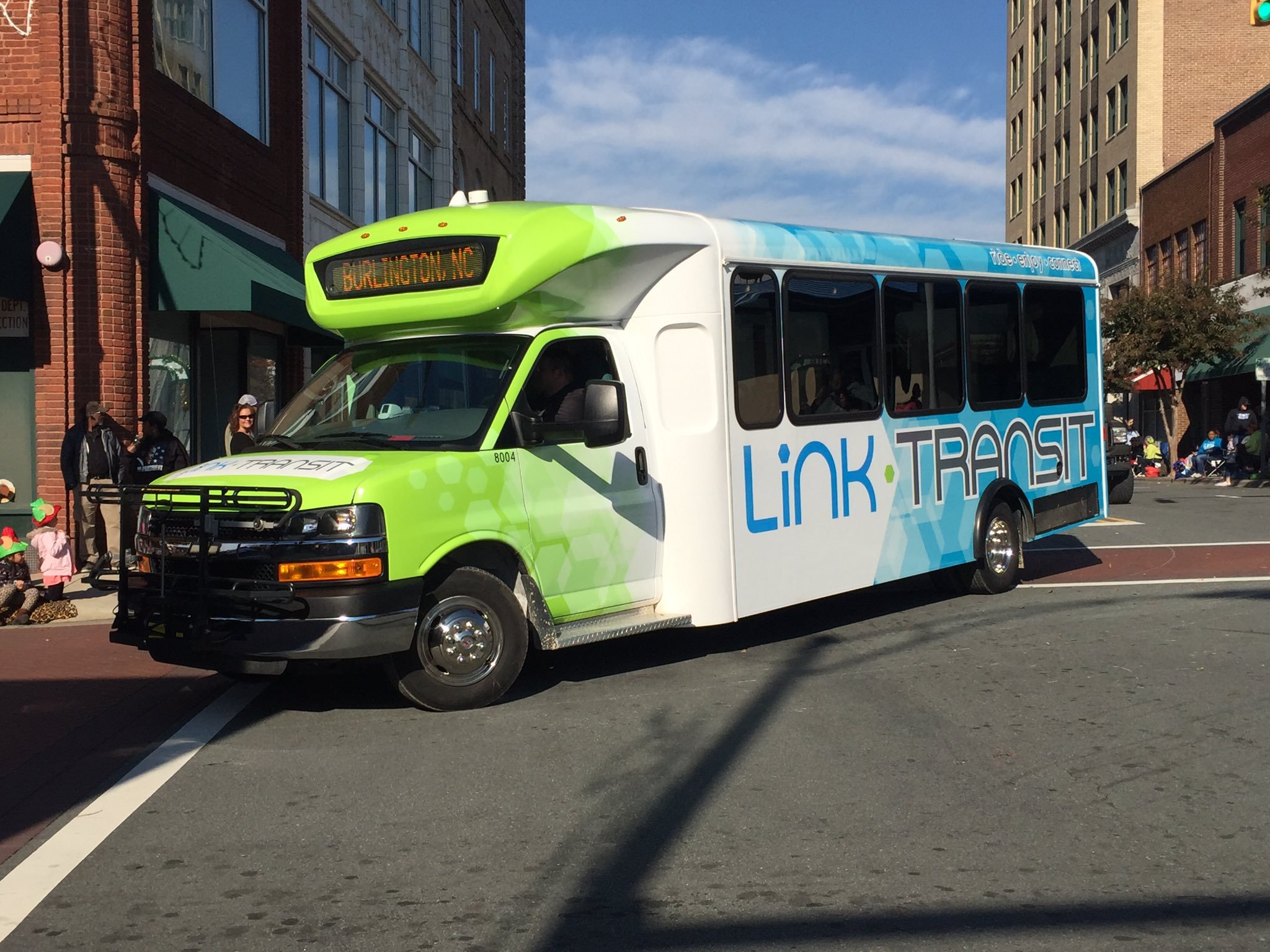As one of the nation's newest transit systems is celebrates its first anniversary, it highlights a tension faced by bus providers throughout auto-oriented parts of United States: can something that's seen primarily as a lifeline for the poor ever transform into a public utility used by everyone?
Burlington, North Carolina, is a city of 52,000 in the middle of Alamance County, halfway between Greensboro and the Raleigh/Durham/Chapel Hill triangle. Until last year, the rapidly growing area was the only place in the state that qualified for federal transit funds but turned them down because it didn't have a transit system. The only options were a county-operated paratransit service and a four-times daily express bus between Greensboro and Chapel Hill. That changed last June, when the city unveiled Link Transit, contracting with a private operator to launch five color-coded bus routes radiating from downtown Burlington.
Last week, Link Transit celebrated its first anniversary by offering free rides. Natalie Allison Janicello at the Burlington Times-News explains how people are using the new bus system:
As [Contessica Terry] rode to her disabled mother’s home to help her get ready Thursday morning, Terry considered the other stops she would need to make, like going by the library and putting in an application at Taco Bell.
At the time she went to prison five years ago, there was no bus system in Alamance County. Without access to a vehicle, Terry would walk across the city and around Graham, not unlike many others in her position.
Just days after being released, Terry was on Link Transit for the first time. With a way to get around, she was hopeful for her future...
As the public bus system marks a year of service this week, city officials in Burlington and community leaders like the United Way are hearing from riders more stories like Terry’s:
A man who works at Arby’s who used to have to pay someone $10 to drive him to work.
An elderly woman who used to ride a bicycle around the county to get where she needed to go.
Link Transit, which charges a $1 fare, has served more than 80,000 trips in its first year. Forty-nine percent of its riders are either students or people over the age of 60 -- groups that qualify for half-price fares, says Mike Nunn, the city's transportation director.
Having transit where there was none before is encouraging news. Transit is necessary so people who don't have the means or ability to drive still have access to necessities like fresh food, employment, school, social activities with friends and family, and more.
Right now, the buses run about every 90 minutes between 5:30 a.m. and 6:30 p.m. on weekdays. There are no plans to expand right now, Nunn said, but riders have expressed interest in adding evening and weekend service. Supporters of Link Transit, who want more buses, have made the argument that the service is needed to help the poor.
"It’s been decades since the people have had a viable public transportation system here, and a big reason for that delay has been a lack of interest on the part of the majority of the county’s residents to subsidize something they don’t personally need," Steve Harrison, chair of the Gibsonville planning board, wrote in February. "A true community is not composed of merely the wealthy or even the comfortable middle class. It is everybody -- and that includes the least fortunate among us."
But transit shouldn't just be for marginalized groups. It's something that -- with the right investments and land use policies -- can be convenient and accessible to everyone. As Enrique Peñalosa, the former mayor of Bogotá, Colombia, says, "An advanced city is not a place where the poor move about in cars; rather, it's where even the rich use public transportation."
Though it may be a long time before transit is seen as an essential public service for everyone in Burlington, some people are making exactly that argument.
“When you live in a city that’s of some size, there are certain services and abilities that give you a quality of life,” Nunn told the Times-News. “And I think public transportation is one of those, just like parks and recreation, just like having police protection and fire protection and water and sewer. That is an urban expectation for most people.”
So happy birthday, Link Transit. Here's to many more years of connecting Alamance County's neediest residents -- and eventually, all residents -- to their destinations.






